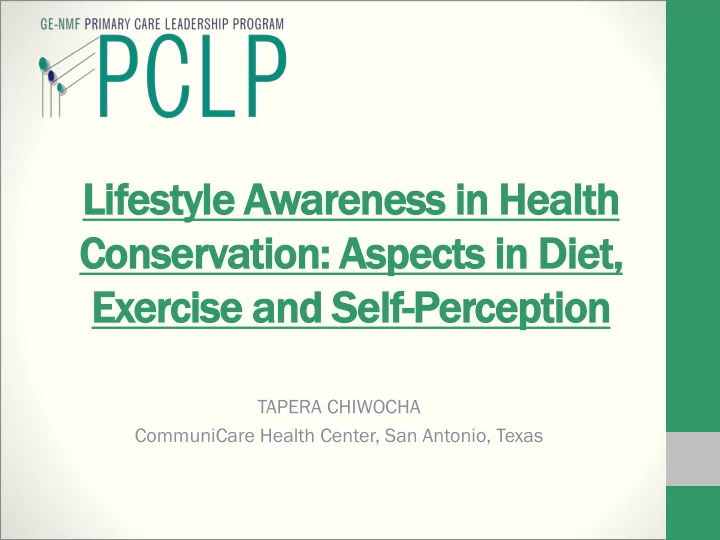

Lifestyle Awareness in Health Conserv rvation: Aspects in Diet, Exercise and Self-Perception TAPERA CHIWOCHA CommuniCare Health Center, San Antonio, Texas
Introduction • The CommuniCare Health Center is a comprehensive health provider that serves the underserved population of San Antonio. • The CommuniCare Health Center treats diabetes and hypertension, among other diseases. • One of the leading diseases in the US, hypertension afflicts nearly 76.4 .4 million ion adul ults ts. • We can minimize the long term negative effects of the disease by understanding the patients, their lifestyles, and their beliefs.
Background • The Center for Disease Control reports that hypertension killed 26,634 people in 2010. • Hypertension can be effectively treated by diet and exercise. • A patient’s self -perception and lifestyle changes can contribute to the understanding and management of the disease. Virginia W. Chang and Nicholas A. Christakis in their research study, “Self -Perception of Weight Appropriateness in the United States,” concluded that environmental factors affect people’s self- perception of weight. • 38.3% of normal weight women thought they were overweight while 32.8% of overweight men thought they carried the right weight or underweight.
Methodology • Group measured: • Ages 18-75 • Males and females • Patients at CommuniCare Health Center • A questionnaire was distributed to each patient that came to Dr. Thackeray’s office on the West Campus: • Due to the high population of Hispanics, the survey was in both English and Spanish. The survey recorded height, weight, and age. I assessed their risk of disease by questions and their history. • I asked questions about their lifestyle and lifestyle change, attitudes and understanding. • I also studied perception of their own obesity.
THE Questionnaire • Basic Survey y Quest stion ons • Sex: M or F • What is your weight? __________ • What is your age? _______ • How tall are you? _______ • What is your zip code? __________ • Blood Pressure ________________________ • Do you have any of the following __________________ • Heart attack ,Coronary artery disease , Stroke, Peripheral vascular disease , Heart failure , High cholesterol, Kidney Disease, Diabetes, and Smoking. • Does a blood relative in your family have a history of heart disease (i.e., heart attacks?) • Do you consider yourself to be medically obese? ___________ • Lifestyle le Survey y Question ons: • Do you feel that you would be healthier if you made lifestyle changes? __Yes __No • If yes, are you willing to make lifestyle changes? __Yes ___ No • If yes, could you answer the following? • How much weight do you plan to lose? ___________________ • Will you engage in regular physical activity? Yes______ No ____ I already do this ____ • Will you eat a healthy diet? Yes _____No_____ I already do this ______ • Will you eat a lower-salt diet? Yes ____ No_____ I already do this ______ • Will you limit alcohol abuse? Yes ____ No_____ I already do this ______
Results • Total participants 40 • Females 36 • Males 4 • Ages of participants 20- 63 • On average, females were much older than males. • Avg. BMI 31, average BP of 120/72 • BMI above 30 is obese; 15 of 34 recorded responses met obesity. • Males were actually more obese than females, but • females considered themselves more obese. • Males were more willing to exercise than females, to drink less alcohol, and to eat a low salt diet.
Discussion • Females thought they were more obese than men though men were in fact more obese than them. Men’s BMI and blood pressure were fairly similar or higher than that of females. Females were misled by Society into believing they were fatter. • Female self-misperception supported by studies such as that of Virginia W. Chang and Nicholas A. Christakis in “ Self-Perception of Weight Appropriateness in the United States.” • It is unclear whether this means males are more willing to adapt or whether women are more realistic.
Important topics to Note • Most of the people surveyed were Hispanic and female. Many of them were dismissive of the BMI chart. • The Average age was in low 40s; most women were older than the males. • Prescription refills • Refills of prescriptions lacked description of purpose. They just listed the name of the medication. This was not helpful.
Recommendations • The patients of the CommuniCare Health Center were either elderly or had limited levels of literacy. Proper labeling of medicine bottles is necessary as patients tended to forget. • Since this was an “in - site” study, hopefully the CommuniCare Health Center can use it to develop more comprehensive and in depth studies that will help a better understanding of health care literacy. • The CommuniCare Health Center could use these data to determine what populations to study and target in the future as well.
Conclusion • Males and females vary in their lifestyle behaviors, beliefs and will to change lifestyle. • One of the most significant differences between males and females has to do with how they view their own obesity. • Another interesting difference is that men are more willing to make changes in their lifestyles. This could be for various reasons. • In the future, other studies that can help us understand healthcare literacy might need to be carried out.
Recommend
More recommend